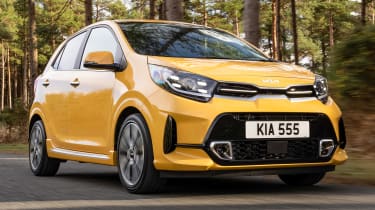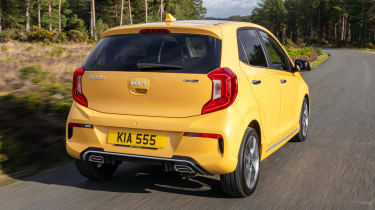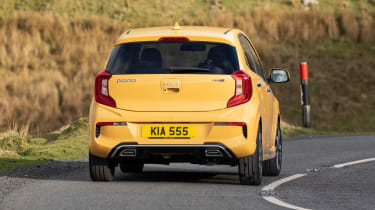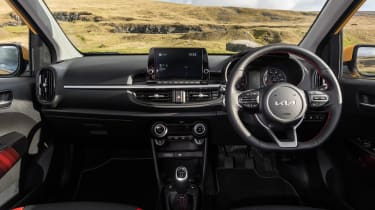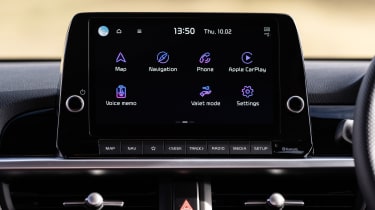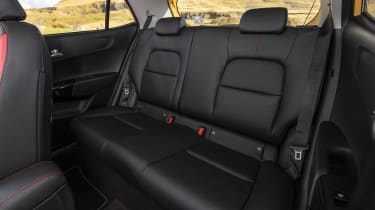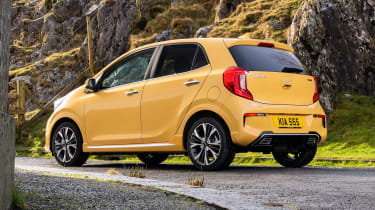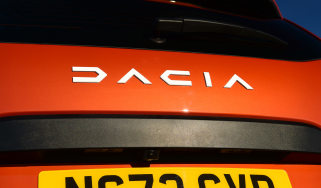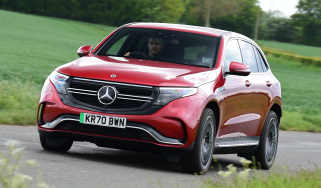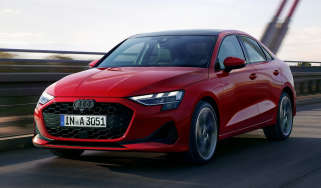Kia Picanto review
The Kia Picanto city car has plenty of kit and offers a grown-up drive to go with its sporty looks

As with many Kias, the transformation of the Picanto from the drab and sparse first-generation car to this Mk3 model is a big one. Building on the stylish design of the Picanto Mk2, the South Korean city car delivers a higher quality and better-equipped interior, more space, a grown-up driving experience and extra personalisation. Kia even offers an SUV-style X-Line model for those after the crossover look.
The standard petrol engines need to be worked hard, although the turbo petrol model is better in that regard. All of the key ingredients for a winning city car are present and correct here, making the Picanto an enticing, likeable and easy-to-drive offering that should be on any city car buyer's shortlist.
About the Kia Picanto
Launched in 2017, the third-generation Picanto is the smallest car for sale in Kia's UK dealerships. It's a strong contender in the city car class, thanks to impressive interior dimensions for its size, a competitive price list and low insurance and everyday running costs.
It faces tough competition from the likes of the VW up! and Hyundai i10, which rival it punch-for-punch in terms of affordability, so it makes sense that Kia decided to give the Mk3 model a mid-life facelift in 2020 – introducing updated engines and improving levels of standard equipment.
Although rivals such as the Citroen C1, Peugeot 108 and Toyota Aygo have now been discontinued, buyers still have the Fiat Panda, Toyota Aygo X and Citroen C3 to consider, while the Dacia Sandero offers the space of a supermini for the budget of a city car.
More reviews
Car group tests
- Hyundai i10 vs Kia Picanto: 2022 twin test review
- Hyundai i10 vs Toyota Aygo vs Kia Picanto
- 3. Kia Picanto - Best city cars
- Kia Picanto vs Volkswagen up!
- Toyota Aygo vs Kia Picanto
- Kia Picanto: £99 per month
In-depth reviews
Road tests
Used car tests
Kia no longer offers a three-door Picanto, so your sole body option is a five-door hatchback. The Picanto comes in the logically numbered 1, 2, and 3 trims, while sitting at the top of the range are the X-Line S, GT-Line and GT-Line S models. As the name suggests, GT-Line and GT-Line S cars have a sporty look, while the X-Line S adds a raised ride height, chunky off-road bumpers and wheel arch extensions for a diddy SUV look. Prices start from around £13,500, while the most expensive Picanto will set you back more than £17,000.
There are two petrol engines offered in the Picanto: a 1.0-litre three-cylinder and a 1.0 T-GDi turbo version. These produce 66bhp and 99bhp, respectively, although not all engines are sold in every trim. If you want the turbo triple, you have to get either the GT-Line or GT-Line S models. All cars come with a five-speed manual gearbox as standard, but there is a five-speed automatic available with the non-turbo petrol.
The entry-level Picanto in '1' trim is pretty basic, featuring electric front windows only, a 2-speaker stereo and manual door mirrors. On the plus side, you get aux and USB sockets, as well as a host of safety equipment such as hill-start assist control and a tyre pressure monitoring system.
The Picanto 2 is £1,500 extra, but adds alloy wheels, air conditioning and electrically adjustable and heated door mirrors. Move up to the '3' spec, and you get luxuries such as sat-nav, Apple CarPlay, Android Auto, a reversing camera system and more.
Beyond that, the GT-Line, X-Line S and GT-Line S offer either sporty or off-roader looks. A body kit, big bumpers and red detailing mark out GT models. The X-Line S model has a ride height raised by 15mm and chunky bumpers, although, like the rest of the range, it's front-wheel drive. Meanwhile, GT-Line trims include 16-inch alloys, LED daytime running lights and rear privacy glass, while the GT-Line S comes with cruise control, heated front seats and an electric sunroof, among other luxuries.
Engines, performance and drive
Kia says the alterations it’s made to the Picanto’s engine and chassis add up to make this the quietest city car around, both at idle and at a cruise. Yet while it’s definitely an improvement on the previous generation, it still doesn’t quite rival the VW up! when it comes to maturity on the move.
While it’s no longer overall than the previous version, an extended wheelbase and shorter overhangs give the Picanto a more dynamic appearance and tighter turning circle. Lengthening the wheelbase has also improved the ride, so over rolling bumps the Picanto feels relatively relaxed for its size. Sharper ridges in the road cause the chassis to react abruptly, though – especially from the rear, where the car pogos up and down, lacking body control. Around town, this firmer edge to the ride is less noticeable, and the Picanto copes with ripped-up and rucked urban roads reasonably well.
We found the Picanto 1.0 is just as quiet as a (now-discontinued) Skoda Citigo at 70mph when we tested them together. It does sit at higher revs than the Citigo in top gear, though, which explains its superior in-gear performance as well as the extra vibration inside, even if it’s slightly quieter. It feels at home at that speed, too, thanks to decent body control.
A more severe bump will unsettle the car slightly, however, so it’s not quite as composed as the Skoda. At low speed, there’s less of a difference, and the Kia rides smoothly enough. The steering isn’t quite as direct as the Citigo’s, but it is a bit heavier. It’s still enjoyable to nip about in, but as with the steering, the gearbox isn’t as sharp as the Skoda’s.
The crossover-inspired X-Line model sees the Picanto's ride height raised by 15mm. This makes access to the cabin marginally easier, but the extra road noise and firmer ride generated by its 16-inch alloys mean that the standard Picanto seems a better, and cheaper, option.
0-62mph acceleration and top speed
The 1.0-litre Picanto does 0-62mph in 13.8 seconds, while the 1.0 T-GDi turbo petrol shaves four seconds off the time, allowing you to complete the benchmark dash in 9.8 seconds. Unfortunately, this engine is only offered in the more expensive GT-Line and GT-Line S models to go with their sportier looks. All cars come with a five-speed manual gearbox, though the optional five-speed automatic isn’t available on the turbocharged engine.
The non-turbo 1.0-litre three-cylinder motor offers adequate performance. When we tested it, the 0-60mph sprint took 12.4 seconds, but flat-out performance isn’t a priority in a city car. Chopping and changing between speed limits in built-up areas means torque and tractability are more important, so the Kia’s decent showing between 50-70mph in fifth, taking 13.9 seconds, and its 9.5-second time from 30-50mph in fourth highlights the flexibility of its performance.
The naturally aspirated triple is smooth, and revs fairly sweetly. The gearshift isn’t quite as positive as a VW up!’s, but it’s by no means obstructive when you’re trying to make progress
MPG, CO2 and running costs
Whichever way you look at it, the Kia Picanto is one of the most affordable cars money can buy. That goes for everything from list price, to fuel and other consumables – even the brightly coloured option packs offer decent value.
Depending on the spec, official fuel economy for the 66bhp Picanto varies from 55.4 to 58.9mpg – or 52.3 to 54.3mpg, if you replace the five-speed manual gearbox with the optional automatic. In comparison, Kia says the 99bhp turbo-petrol engine should return an average of 53.3mpg.
Likewise, the less powerful petrol engine is better when it comes to CO2 emissions, with Kia claiming it emits 110-123g/km depending on the spec. The turbo-petrol engine has slightly higher emissions of 123-129g/km – meaning, despite the increase, the 99bhp 1.0 T-GDi should only be mildly more expensive to tax than the regular 1.0-litre engine.
Do bear in mind that, as part of the recent updates to improve economy and emissions, there are some differences in the specs between the pre- and post-facelift Picantos. For instance, whereas the original Mk 3 Picanto was available in four and five seat configurations, most of the Picanto range now only comes with four seats – if you need more room for passengers, you’ll need to go for the five-seater-only X-Line versions.
Insurance groups
Insurance groups for the Kia Picanto are low, though vary across the range. They range from 1 to 5 for the regular models, or from 2 to 5 for X-Line versions. Groups for GT-Line and GT-Line S cars with the 66bhp engine range from 2 to 4, and then jump to Group 11 if you spec the turbo-petrol engine.
You can get personalised car insurance quotes fast with our comparison tool powered by Quotezone…
Depreciation
The Picanto continues to be a decent performer for residual values, and the low list prices mean the money you’ll lose is comparatively small compared to cars in the class above. According to our latest expert data, the Picanto will retain between 46 and 56 per cent of its original list price after three years and 36,000 miles of driving, with the GT-Line and GT-Line faring the best.
To get an accurate valuation on a specific model check out our valuation tool...
Interior, design and technology
Kia says only 10 per cent of buyers in this sector opt for three-door models, so the company has sensibly taken the decision to stop producing the less practical version of its entry-level car. As the Picanto’s new-found focus is on refinement and maturity, sticking to the more practical five-door bodystyle is a good move.
Underneath, the Picanto uses MacPherson strut suspension at the front and a torsion beam at the rear, while its platform has also grown in size with a 15mm-longer wheelbase helping create more room inside. The more spacious cabin tallies with modifications made elsewhere to improve refinement, so there’s a new soundproofing panel beneath the dash and under the cabin, plus sound-absorbing foam at the base of the A and B-pillars. These are said to reduce wind and road noise, while a new engine cover, revised intake design and tweaked engine mounts help reduce noise and vibration from the motor.
Improvements in driving refinement are matched by higher-quality materials inside over its predecessor, but the plastics throughout the cabin still don’t quite feel a match for those in a Volkswagen up!, although it is an improvement over the old model. You get an acceptable level of kit with the '2' specification, including Bluetooth, 14-inch alloys, air-con and all-round electric windows as standard – but beyond this there isn’t much. You’ll have to upgrade to the 3 model if you want more connectivity and better infotainment, which will cost you about £1,500.
Quality is good, and much improved over the Mk2 Picanto, which was showing its age in places. Black and grey cloth comes as standard, but buyers can opt for one of several interior colour packs to brighten up the cabin. There are loads of new exterior hues, too, which should appeal to younger buyers. GT-Line and GT-Line S cars get red details on the grille and bumpers, as well as similar flashes inside.
Sat-nav, stereo and infotainment
There’s not much in the way of infotainment if you get the Picanto in the most basic '1' trim. A small dot-matrix screen comes as standard, while USB and aux-in ports are also included. If you want Apple CarPlay and Android Auto, you have to upgrade to the '3' trim or above, where you’ll also find a larger eight-inch touchscreen and a DAB radio.
Meanwhile, '2' trim receives a four-speaker stereo against the standard two-speaker set-up in the entry-level model. Sound quality is OK. The USB socket means you can charge your smartphone on the move, but that this is a highlight alone shows how limited the Kia’s multimedia offering is. Compared with the colour screen in the VW up!, it feels well behind the curve.
The eight-inch touchscreen on the 3, X-Line, GT-Line and GT-Line S cars brings Apple CarPlay, Android Auto and 3D sat-nav maps. It’s as simple and easy to use as it is in the flagship Sorento SUV, with all the same software and identical menus. Everything is logically laid out and easy to use, meaning changing the radio or making a call is simple and straightforward on the move.
Practicality, comfort and boot space
Few people buy a city car for outright practicality, but for those interested in a tiny car with generous interior dimensions, the Kia Picanto impresses.
There’s no three-door model, but access via the wide-opening rear doors makes getting in and out infinitely easier. The majority of the Picanto range is exclusively available in a four-seater spec – if you need the extra versatility that comes with having an extra rear passenger seat, your only option is to go for the slightly higher-riding X-Line S version.
Visibility is good, thanks to the thin pillars and upright rear screen, with top-spec cars offering a reversing camera as standard. Other practical features include a small central armrest, as well as usable door bins and a decent glovebox. You’ll also find a couple of cupholders ahead of the gear lever.
Size
The Mk3 Picanto is no longer overall than the car it replaced. However, by extending the distance between the front and rear wheels, the designers and engineers have managed to increase cabin comfort for all passengers.
At 3,595mm long, the Picanto is among the smallest cars on sale and beats the closely related Hyundai i10 for dinky dimensions. At 1,595mm wide, it’s easy to park, too. The X-Line S version have slightly increased dimensions, being 30mm wider and 15mm taller, with overall length also up by 75mm.
Leg room, head room and passenger space
The longer wheelbase has definitely freed up more knee room in the rear compared to the previous Picanto, and decent door openings mean it’s easy to get into the back. Storage and ergonomics are acceptable as well, although seat comfort could be a little better for longer journeys.
Almost every version of the Picanto comes with four seats only. As a result, adults have a bit more shoulder room in the back, however this does limit the car’s versatility in comparison with five-seater rivals. If you need a Picanto with extra seating capacity, the X-Line S version gets five seats, but do bear in mind that (with prices starting from over £17,000) it is one of the more expensive Picantos you can buy right now.
Boot
The Picanto actually boasts best-in-class boot space. Enlarging the Picanto’s platform has created more luggage room as well as cabin space. The boot is now 255 litres with the seats up (nearly as much as in some superminis), and rises to 1,010 litres with them folded down.
Few people buy a city car to carry really big loads, but on the odd occasion when space is a priority, the Picanto can deliver. In comparison, a Hyundai i10 offers 252 litres, while the VW up! boasts a 251-litre load bay.
Reliability and Safety
Kia has built a hard-earned reputation for reliability over the past two decades, cemented by a bold seven-year/100,000-mile warranty. In our 2022 Driver Power owner satisfaction survey, the South Korean brand finished 3rd out of 29 best manufacturers with feedback focusing on how Kia provides comfortable, reliable, high-quality cars.
The Picanto finished 15th (on a 75-car list) in the best cars to own poll, with the XCeed small SUV taking first place, plus the Rio supermini and Sportage SUV also in the top ten.
Euro NCAP crash tested the Picanto in standard and safety pack-equipped guises in 2017, and they earned three and four stars respectively. Automatic Emergency Braking features on the safety pack-equipped cars, and this uses a long-range radar to detect slowing vehicles, first playing an audible warning, before applying the brakes to prevent a collision. Cruise control and Rear Park Assist also feature.
Warranty
All Kias – including the most basic Picanto – come with a seven-year/100,000-mile warranty. While most people won’t keep their car that long, it shows impressive confidence in the product – backed up by a solid performance in our annual Driver Power survey. It also means that, depending on how long you keep the car before you sell it on, the Picanto will have the extra appeal of still having a bit of warranty cover left. Rivals like the VW Up! get a three-year warranty, while even Hyundai (Kia’s sister brand) can only manage a five-year guarantee on the i10.
Servicing
Kia Care is the manufacturer's service plan package, which provides fixed servicing costs specific to the age and mileage of your vehicle. Kia also offers its Drive Now, Pay Later scheme where customers are able to pay 25% of servicing costs up front, with 0% interest on the remaining balance for 3 months.
For an alternative review of the latest Kia Picanto Hatchback, visit our sister site carbuyer.co.uk...
Which Is Best
Cheapest
- Name1.0 1 5dr [4 seats]
- Gearbox typeManual
- Price£12,730
Most Economical
- Name1.0 1 5dr [4 seats]
- Gearbox typeManual
- Price£12,730
Fastest
- Name1.0T GDi GT-line 5dr [4 seats]
- Gearbox typeManual
- Price£15,360

